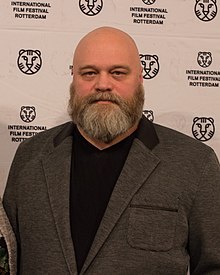Alexei Stanislavowitsch Fedorschenko
Alexei Stanislavowitsch Fedorschenko ( Russian Алексей Станиславович Федорченко ; born September 29, 1966 in Sol-Ilezk ) is a Russian film director, screenwriter and film producer.
Life
Alexei Fedorschenko attended the Polytechnic Institute of the Urals in Sverdlovsk , where he studied at the faculties of engineering and economics. After graduating in 1988, he worked as an industrial engineer in a factory in Sverdlovsk. Fedorschenko came into contact with film in 1990 when he got a job as a senior economist at the Sverdlovsk film studios founded in 1943 . There he rose to head the production department of the film studio for the next ten years and was involved in the production of numerous films and news reports.
Parallel to his work as a film and television producer, Fedorschenko attended the Moscow Film School WGIK , where he trained as a screenwriter from 1998 to 2000. His first film work began in the late 1990s. After the documentary David (2002), which was produced in Stockholm, Sweden and Lublin , Poland , Fedorschenko contributed the script for Igor Voloshin's short film Ochota na saizew in 2003 . His international breakthrough as a filmmaker came in 2005 with his feature film debut First on the Moon ( Perwyje na Lune ). The fictional documentary film about a Russian moon landing in 1938 received several international festival awards, including the documentary film award in the Orizzonti section of the Venice International Film Festival .
In 2007, Fedortschenko's second feature-length film followed with Schelesnaja doroga . The work, located somewhere between drama and comedy, focuses on two friends who steal a coal wagon from a railway museum in order to sell it later. Three years later, Fedorschenko received another invitation to the Venice Film Festival for the feature film Stille Seelen (2010; Russian title: Ovsjanki ) , this time in the competition for the Golden Lion . The story of two men who, according to a custom of the Finnish-Ugric people of the Merja, perform the ritual burial of a woman, met with critical acclaim. Silent souls was considered one of the favorites for the main prize and won, among other things, the FIPRESCI prize and the award for the best camera work.
Filmography (selection)
- 1999: Klassika Z ( Классика Z )
- 2000: Neobyknowennyj concert ( Необыкновенный концерт )
- 2000: David ( Давид )
- 2003: Deti beloj mogily ( Дети Белой Могилы )
- 2005: Pervye na Lune ( Первые на Луне )
- 2007: Zheleznaya doroga ( Железная дорога )
- 2010: Silent Souls , Ovsjanki ( Russian Овсянки )
- 2012: The Fourth Dimension
- 2012: Nebesnye zeny lugovykh mari
- 2014: Angely revoljuzii ( Ангелы революции )
Awards
- 2005: Special prize and prize for the best first work of the student jury for Pervye na Lune
Ghent International Film Festival
- 2005: nominated for the Grand Prix for Pervye na Lune
Open Russian Film Festival Kinotaur
- 2005: Best Debut Film and Prize of the Association of Russian Film Studies and Critics for Pervye na Lune
Festival Internacional de Cine de Mar del Plata
- 2011: Best Director for Stille Seelen
Venice International Film Festival
- 2005 : Documentary film award of the Orizzonti section for Pervye na Lune
- 2010 : FIPRESCI Prize , Premio Padre Nazareno Taddei and nominated for the Golden Lion for Ovsyanki
Warsaw International Film Festival
- 2005: Honorable Mention for Pervye na Lune
Web links
- Biography at kino-teatr.ru (Russian)
- Profile at russiancinema.ru (Russian)
- Aleksei Fedorchenko in the Internet Movie Database (English)
Individual evidence
- ↑ Profile ( memento from January 28, 2012 in the Internet Archive ) at arthouse.ru (Russian; accessed on September 10, 2010)
- ^ AFP : In Venice, Russian, Chilean films favored for Golden Lion. September 10, 2010, 5:33 PM GMT (accessed September 11, 2010 via LexisNexis Business ).
- ↑ antipode-sales.biz
| personal data | |
|---|---|
| SURNAME | Fedorschenko, Alexei Stanislavowitsch |
| ALTERNATIVE NAMES | Fedorchenko, Aleksei |
| BRIEF DESCRIPTION | Russian film director and screenwriter |
| DATE OF BIRTH | September 29, 1966 |
| PLACE OF BIRTH | Sol-Ilezk , Soviet Union |
